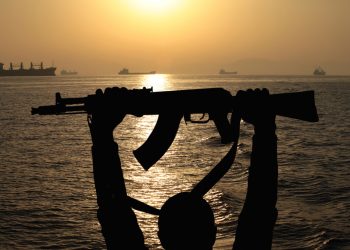Highlighting one of the major issues in the EU-Africa relations
 The social partners of the maritime transport sector, ECSA (European Community Shipowners’ Associations) and ETF (European Transport Workers’ Federation), have issued a joint statement ahead of the EU-Africa summit, which takes place in Brussels from 02 to 03 April.
The social partners of the maritime transport sector, ECSA (European Community Shipowners’ Associations) and ETF (European Transport Workers’ Federation), have issued a joint statement ahead of the EU-Africa summit, which takes place in Brussels from 02 to 03 April.
ECSA and ETF seize this opportunity to highlight one of the major issues in the EU-Africa relations, namely that of piracy and armed robbery, two phenomena that plague some of the world’s busiest shipping routes.
“Piracy and armed robbery should be part of the discussion between EU and African leaders, as the problem is shared by both sides and, more importantly, its more permanent solution can only be achieved through common initiatives and efforts from both partners” commented Patrick Verhoeven, ECSA Secretary General.
More specifically, ECSA and ETF call upon the EU Member States to uphold their commitment to fight Somalia-based piracy by maintaining an adequate level of force generation and supply the EU’s naval force in the region (EU NAVFOR) with sufficient resources to effectively patrol the area of operations.
As for piracy and armed robbery incidents in the gulf of Guinea in West Africa, the social partners urge Member States to use diplomacy, political dialogue but also the sharing of best practice and technical assistance so as to develop solid cooperation with African coastal states in the region and fight against these unlawful acts.
| East Africa |
|
Since 2011, the number of Somali piracy attacks has steadily decreased, due to a combination of factors: EU and international naval units patrolling the wider area off the coast of Somalia and the Indian Ocean, the application of industry Best Management Practices that are designed to reduce a ships vulnerability and the increased use of private armed guards and vessel protection detachments on board vessels. However, the European Social Partners in Maritime Transport warn that the reduction of pirate attacks off the coast of Somalia should not be misinterpreted. Until a permanent solution is found on land, efforts by the shipping industry and the international community will only address the symptoms, rather than the root causes of piracy. The number of interventions by naval forces (86 by EUNAVFOR since May 2009 only to deter attacks) clearly shows that the work is not yet done. |
| West Africa |
|
Unfortunately a different piracy business model has emerged in West Africa, where the coastal states are sovereign (unlike Somalia in the past) and piracy is linked to oil theft, corruption and other types of maritime crime. Attacks are often more violent and usually target valuables on board, including the ships cargo. However, the European Social Partners are increasingly worried by the increase of kidnappings of seafarers and hijackings of ships. In 2013, 53 piracy incidents took place in West Africa, off the coast of Congo, Gabon, Ghana, Ivory Coast, Nigeria, Sierra Leone, and Togo. Sadly, the first figures for 2014 confirm the raising trend. |
The EU has spearheaded efforts to tackle maritime piracy since the emergence of this problem in the mid-2000s. It now finds itself in a position of even greater influence by having assumed since January the chairmanship of the UN Contact Group on Piracy off the Coast of Somalia (CGPCS).
“I sincerely hope that the EU will use its special weight and extensive experience in its talks with African leaders” remarked Patrick Verhoeven and added: “A far-reaching and all-encompassing solution to this problem that jeopardises the global supply chain is long overdue.“
To read the joint statement please click here
Source: ECSA
































































